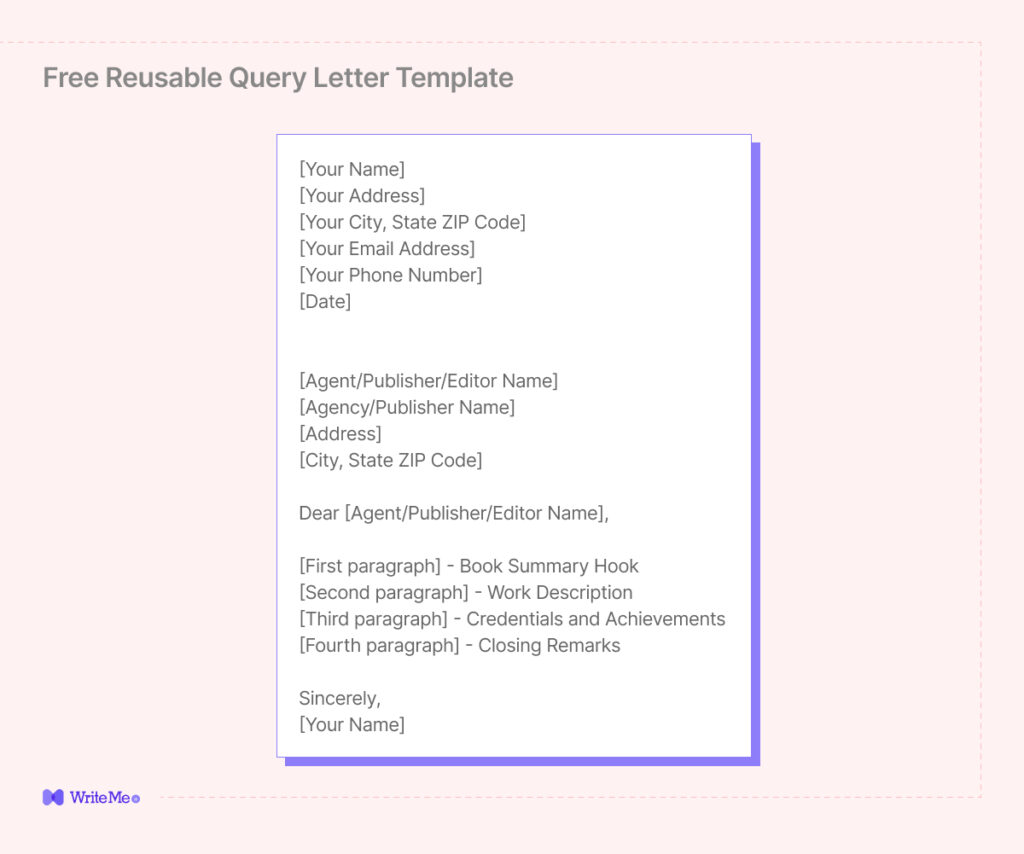- 1) What is a Query Letter?
- 2) Who do You Write a Query Letter for?
- 3) How Long Should a Query Letter Be?
- 4) How Do You Start a Query Letter?
- 5) Example of a query letter opening:
- 6) Tips on How to Write a Query Letter
- 7) Reusable Free Query Letter Template and Format
- 8) Literary Agent Query Letter – Free Example
- 9) Final Thoughts
Are you an aspiring author struggling to write a query letter that will catch the attention of literary agents and publishers? Look no further! In this blog, we’ll provide you with expert tips and a step-by-step guide to writing a successful query letter. Whether you’re a seasoned writer or just starting out, we’ve got you covered. So grab a pen and paper, and let’s get started!
What is a Query Letter?
A query letter is a brief letter that writers send to literary agents or publishers to introduce themselves and their book idea. The letter typically includes a brief summary of the book, information about the author’s background and qualifications, and a request for the agent or publisher to consider the manuscript for publication. The purpose of the query letter is to pique the agent or publisher’s interest and persuade them to request a full manuscript for further review. A well-crafted query letter can be a key factor in a writer’s success in getting published.
Who do You Write a Query Letter for?
In general, query letters are used to pitch works of fiction or non-fiction, as well as articles or essays, to these industry professionals in the hopes of getting published.
Common recipients of query letters include literary agents, publishers, and editors in the publishing industry.
Query Letter for Literary Agents
Literary agents represent authors and help them submit their work to publishers. They often specialize in certain genres or types of writing and have relationships with publishers in the industry. Many publishers only accept submissions from authors who are represented by a literary agent, so it can be important to find the right agent for your work.
Query Letter for Publisher
Publishers are companies that produce and distribute books, magazines, or other publications. They may accept unsolicited submissions directly from authors or require submissions to come through a literary agent.
Query Letter for Editors
Editors are professionals who work for publishers and are responsible for acquiring and editing manuscripts for publication. They may specialize in specific genres or topics and often have a good sense of what will appeal to readers.
How Long Should a Query Letter Be?
A literary query letter should be around 250-400 words in length, which amounts to a single A4 page. The letter should be long enough to effectively convey all the necessary information about the book and the author, while also being short enough to hold the reader’s attention and avoid overwhelming them with too much detail.
How Do You Start a Query Letter?
The beginning of a query letter should be professional and engaging, and should immediately capture the attention of the reader. Here are some tips on how to start a query letter:
Address the recipient by name: Start the letter by addressing the recipient by name, using their full name or their preferred title. This shows that you have done your research and are serious about your submission.
Introduce yourself and your work: In the opening sentence, introduce yourself and your work. Be clear and concise about what you are submitting and why you think it is a good fit for the recipient.
Mention any relevant credentials or achievements: If you have any relevant credentials or achievements, such as writing awards or publications, mention them briefly in the opening paragraph. This can help to establish your credibility and demonstrate your writing experience.
Hook the reader: Use the opening paragraph to hook the reader and make them want to read more. This could be a brief description of your book’s plot or a compelling question that your work explores.
Example of a query letter opening:
Here is a sample query letter for your understanding:
Dear [Agent/Editor’s Name],
I am excited to submit my [genre of book] novel, titled [book title], for your consideration. As a [briefly describe your writing background], I believe my novel will appeal to [insert audience], and I hope you will find it a good fit for your list.
[Provide a brief hook for the book, such as a one-sentence summary of the plot or a question that the book explores that will engage the reader.]
Thank you for your time and consideration.
Sincerely,
[Your name]
(PS: Write engaging query letter introductions similar to these using WriteMe.Ai)
Tips on How to Write a Query Letter
Here are expert tips on how to write a query letter to anyone:
Research the recipient:
Before you start writing your query letter, research the recipient to find out what type of work they represent or publish. This can help you tailor your letter to their specific interests and increase your chances of getting a response.
- Researching agents, publishers, and editors
- Finding the right agent for your work
- Identifying publishers who accept unsolicited submissions
Follow the submission guidelines:
Make sure you carefully read and follow the submission guidelines provided by the recipient. This includes formatting, word count, and any other specific requirements.
- Writing a strong hook to grab the recipient’s attention
- Describing your work in a compelling way
- Highlighting your writing credentials and any relevant experience
- Including a clear call to action at the end of the letter
Keep it short and concise:
A query letter should be no longer than one page, with short paragraphs and plenty of white space. Use bullet points or bolded text to highlight important information.
- Follow submission guidelines provided by the recipient
- Keep the letter short and to the point
- Use short paragraphs and plenty of white space
- Add bullet points or bolded text to highlight important information
Highlight your hook:
In the first paragraph, grab the agent’s attention with a hook that summarizes your book and makes it clear why it’s unique and worth reading.
Show, don’t tell:
Instead of simply telling the agent what your book is about, show them with vivid descriptions and specific details that will help them visualize your story.
- Use vivid descriptions to engage the reader
- Keep your writing focused and concise
- Avoid cliches and overused phrases
- Tailor your letter to the recipient’s interests and preferences
Include a brief bio:
In the last paragraph, include a brief bio that highlights your writing credentials and any relevant experience. Keep it short and focused on your writing background. Use an AI Bio writer to save time and get great bios written in minutes.
End with a call to action:
End your query letter with a clear call to action, such as a request for the agent to request your manuscript or proposal. Remember, the purpose of a query letter is to get the agent’s attention and make them want to read more.
You can also use an AI Writing Assistant to add more appeal to your query letter’s message.
Reusable Free Query Letter Template and Format

Here is a detailed and easy-to-follow query letter template:
[Your Name]
[Your Address]
[Your City, State ZIP Code]
[Your Email Address]
[Your Phone Number]
[Date]
[Agent/Publisher/Editor Name]
[Agency/Publisher Name]
[Address]
[City, State ZIP Code]
Dear [Agent/Publisher/Editor Name],
[First paragraph] – Book Summary Hook
Start your letter with a strong hook that summarizes your book and makes it clear why it’s unique and worth reading. This is where you grab the recipient’s attention and make them want to keep reading. Be concise and compelling.
[Second paragraph] – Work Description
In this paragraph, describe your work in a bit more detail. Include the genre, word count, and any other relevant information that will help the recipient understand your book. This is also a good place to show, not tell, by using vivid descriptions and specific details to help the recipient visualize your story.
[Third paragraph] – Credentials and Achievements
Highlight your writing credentials and any relevant experience you have. Keep it brief and focused on your writing background. This is also a good place to mention any social media presence you have that may be relevant to your book or writing career.
[Fourth paragraph] – Closing Remarks
In this paragraph, include a brief closing that thanks the recipient for their time and consideration. End with a clear call to action, such as a request for them to request your manuscript or proposal. Be polite and professional, and make it clear that you would be happy to provide additional information or answer any questions they may have.
Sincerely,
[Your Name]
[Optional: Include a brief bio or author’s note at the end of the letter, if desired.]
Remember to keep your query letter short and to the point, with short paragraphs and plenty of white space. Use bullet points or bolded text to highlight important information, and make sure you follow any submission guidelines provided by the recipient. By using this template as a guide, you can create a professional and effective query letter that will help you get noticed and get published.
Literary Agent Query Letter – Free Example
Mary Jane
123 Main Street
New York, NY 10001
maryjane@email.com
(555) 555-5555
March 6, 2023
Mark
Penguin Publishers
375 Hudson Street
New York, NY 10014
Dear Mark,
What if the zombie apocalypse happened tomorrow? That’s the premise of my debut novel, “Rising of the Undead.” In a world overrun by the undead, a small group of survivors must band together to fight for their lives and rebuild society. I am thrilled to share my novel with you in the hopes that you will be interested in representing my work.
As a writer with 5 years of experience and published credits in [publications or anthologies], I am confident that “Rising of the Undead” is a unique and thrilling addition to the zombie apocalypse genre. With its fast-paced action and unique twist on the undead, I believe it has the potential to capture readers’ attention and leave them wanting more.
I have attached a manuscript of “Rising of the Undead” for your consideration. If you are interested in representing me and my work, please let me know. I would be honored to work with you and bring this story to a wider audience.
Thank you for your time and consideration.
Sincerely,
Mary Jane
123 Main Street
New York, NY 10001
maryjane@email.com
(555) 555-5555
About the Author:
Mary Jane is a writer with a passion for science fiction and horror. Her work has been published in [publications or anthologies], and she is excited to debut her first novel, “Rising of the Undead.” In her free time, Mary enjoys reading, watching horror movies, and exploring the city with her dog.
Final Thoughts
In conclusion, writing a query letter can be a daunting task, but with the right approach, it can be a rewarding experience. Keep in mind the importance of a catchy hook, a clear and concise summary of your work, and a professional and polite tone throughout the letter. Remember to tailor your letter to the specific agent or publisher you are addressing, and to highlight your own unique qualifications as a writer. With these tips in mind, you’ll be well on your way to crafting a successful query letter and taking the first step towards getting your work published. Good luck!



